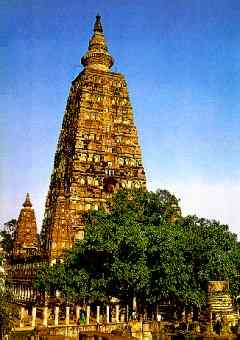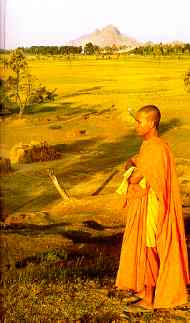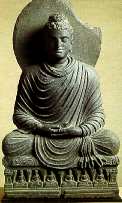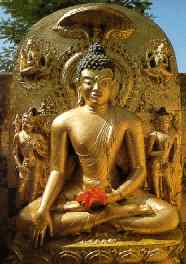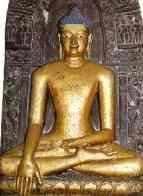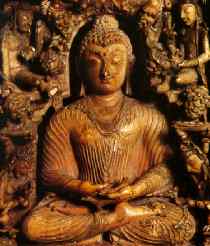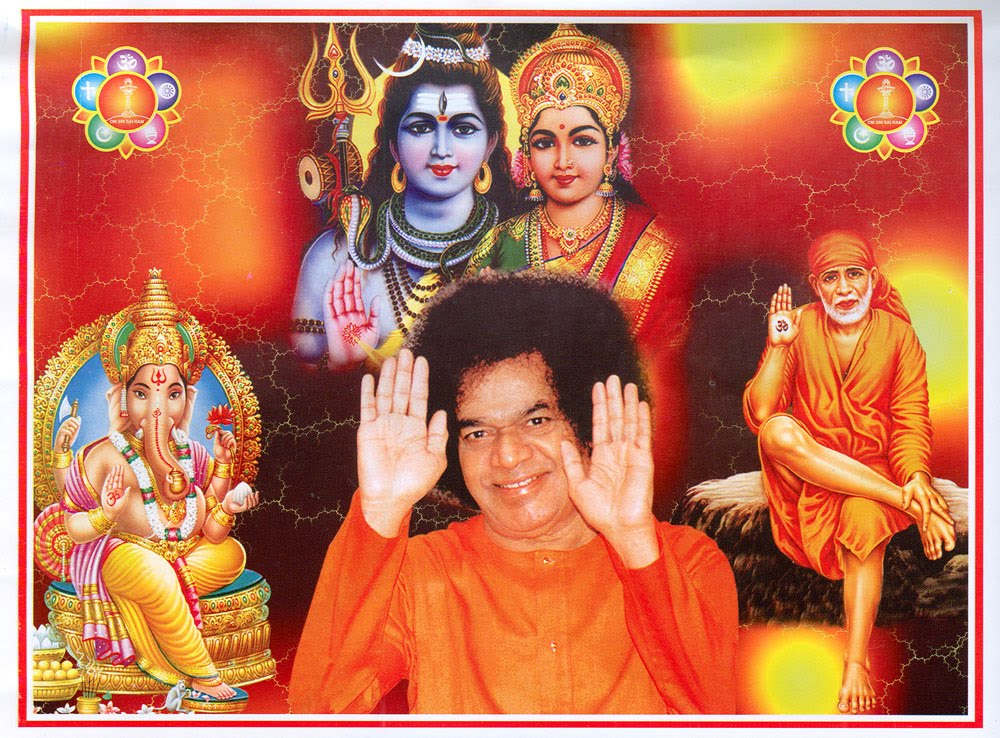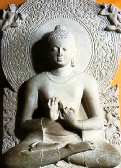 | Buddha |
Gautama (Sakyamuni) Buddha
Buddha was born approximately 560 B.C. in the land of Northern India. Through his life, Buddha gave the concept of Nirvana an unprecedented exposure to a large portion of the Eastern world with his achievement of and subsequent teachings about the state of enlightenment. As a religion, Buddhism contains the attainment of Buddhahood or Nirvana as a central tenet of its teachings. Within the realm of Christianity, the historical Christ echoed the same teaching, though in a veiled form, by saying that the Kingdom of Heaven is within us.In Buddhist thought the world has but a relative reality in that it is a Maya or illusion in which we go round and round the whirlpool of Samsara, the endless cycle of birth and death, gain and loss, pain and pleasure until we begin to search for a way out of the maelstrom of matter. In this objective world nothing is lasting, everything contained within it is in a state of flux or constant change. But the real source of all pleasure, truth, goodness and permanence is not dependent on the objective world at all but is instead contained within us. The inner essence or core of awareness of each of us is the Atma, the real source of all bliss. We experience a small fraction of this bliss as the senses go out after objects in the world. The world is illusory and the pleasures to be had in it are but momentary and fleeting. Buddha sought the means to attain the inner bliss of Nirvana which is permanent.
The story of the life of the Buddha was popularized in the West through the book Siddhartha by Herman Hesse, though the author takes great liberties with the actual facts of the life of young Prince Siddhartha who later became Gautama Buddha. Within the last few decades, many movies have been made of the story. The movie the Razor's Edge, touches upon the difficulties involved in treading the path of spiritual unfoldment leading to Nirvana. The movie takes it's title from the Katha Upanishad which contains the statement:
Approach the feet of the Master and know THAT (the Eternal Absolute).
Narrow is the path and difficult to tread like the Razor's Edge".
The significance and meaning of the life of the Buddha is revealed in the discourses of Sathya Sai Baba. The following are relevant extracts from them.
|
The name given to Buddha at the time of birth was "Sarvaartha Siddha". Suddhodhana got his son married to Yasodhara, daughter of his brother in-law, Suddhabuddha. He apprehended that his son may become a recluse and turn away from the world if he was left to himself. But Buddha did not feel that a married life was the proper thing for him. Buddha felt that man was bound by various attachments in worldly life. Friends and relations were the cause of this bondage. Various human relationships are the cause of sorrow in the world. So he declared: All is sorrow. He also declared Everything is momentary, everything is perishable.
Buddha felt that nothing was truly lasting. He felt intensely unhappy that his parents and others combined to commit him to the bondage of married life. One day, at midnight, Buddha left the palace, giving up his wife and young son, Rahul.
He abandoned everything out of the conviction: "There is no mother or father, no kinsman or friend, no home or wealth. Awaken yourself!" He resolved to find out something which transcends all worldly relationships and pleasures.
Buddha asked himself: "What is this life? Birth is misery. Old age is misery. Wife is a cause of sorrow. There is misery at the end of life. Therefore, be alert and awake."
Happiness is not to be found in any of the things of the world. Everything is fleeting. Man is wasting his life in the pursuit of petty ephemeral pleasures. Nirvana is the only truth. To turn the mind towards that which is permanent is "Nirvana"
Buddha's mother Maya Devi passed away on the seventh day after his birth. Suddhodhana's second wife Gautami, brought up the child. Because he was brought up by Gautami, he was named Gautama Buddha. At the age of 28, he gave up everything and turned a renunciant. What is the significance of this step? Buddha declared "Hands in the society. Head in the forest" He renounced everything to think about promoting the welfare of society.
|
Buddha taught his message in this way to his father, wife and son. Buddha went about preaching his message. Buddha's message spread to many countries like Tibet, China, Ceylon, Burma, Thailand, and Japan.
One day Gautama Buddha saw sheep being driven to be slaughtered at a Yajna (sacrifice). He tenderly lifted a sweet little lamb on his shoulder and followed the sheep to the special enclosure where the ruler of the State was performing the Yajna. On being told that the ceremonial killing of the lamb will bring great good to the ruler and the state, Buddha said, "Of course you must admit that a man, a prince, a monk is much more valuable than a tiny trivial lamb. Kill me and win merit, a hundredfold", and advised him about the inner weaknesses and vices that are symbolized by the victims of the Yajna. Buddha argued him out of his false attachment to the paltry benefits promised for ritual correctitude. He told him that the prayer that rose from every Indian at sunrise and sunset was "Let all beings attain happiness". To kill so that you may live longer and with fuller joy is a reprehensible act, Buddha declared. You have to sacrifice, not a bleating sheep, but your own animality, the bestial lust and greed, hate and malice. Sacrifice these and you earn the heaven of unflinching peace.
|
Buddha was seated alone one day, and later, some men gathered around him. one among them who did not like his teachings and the effect it had on the people got up and started a tirade in very vulgar terms against him. Buddha sat smiling listening to all that calumny, without a single gesture of disapproval. The man got frothy in the mouth through rage, his vocabulary was fast getting exhausted, his tongue began to show signs of overwork, but, Buddha only asked him with a smile, "Brother, have you finished?" The man said, "You have no sense of shame; you do not show any trace of resentment." Then Buddha said "If a kinsman comes to your door from a far distant place, and when you see him, if you so much as say, Hallo, he will enter in, deposit his things in the house, and stay on as your guest; but if you do not notice him, if you ignore his arrival, he will return along the road that brought him and you are rid of him, isn't it? So, too I shall take no notice of this tirade; let it go the way it came". Praise and blame are but twists of verbiage, the magic words in the clever hands of flatterers or traducers. Treat both with a grand indifference; then, your real worth becomes patent.
By not getting excited over the angry words of a critic, one becomes superior to the critic. Otherwise one descends to the same level as the critic. Bear no ill-will towards anyone. That is the golden rule indicated by the Gita. Buddha carried on his mission in this spirit of equanimity and tolerance.
Buddha spoke out against scholarship unrelated to the good life. He carried out a great deal of study and met many great men. He listened to many discourses. he realized that true knowledge could not be got by these means. He realized that a pure unsullied consciousness confers the highest knowledge. True knowledge is derived from a pure inner consciousness (Antahkarana).
|
Buddha, before he attained Nirvana, summoned his step-brother Ananda to his side to impart his last message. Ananda was the son of Gautami (Buddha's step mother). Placing his palm on the head of his younger brother, Buddha said: "My dear child! I came to the world to teach Truth. If anyone asks "Where is God?" the answer is "He is everywhere" Truth is God. Speak the Truth. Do not harm anyone. Recognize that the highest Dharma is non-violence (Ahimsa). This truth is proclaimed in the scriptures in the exhortation: "Speak the truth. Speak what is pleasing". Buddha told Ananda that this truth was learnt by him from his own experience. he said: "When I left the palace, my father (the King) was told that I was doing a great wrong in renouncing the family. My parents, kinsmen, and others tried to put pressure on me to return to the ties of family life. These wrong efforts on their side made me more determined to pursue the spiritual path. Today I have found the truth about life, What is it? The sanctification of the five senses is the way of Truth. If the senses are polluted, of what avail are spiritual exercises? When the water in a tank is polluted, all taps will only give polluted water. Your heart is the tank. Keep it pure through purity of vision, thought, speech, and action.
|
Any happiness experienced through the mind is not spiritual bliss. It is transient physical pleasure. Not recognizing this truth many pursue so-called spiritual exercises with the mind. The mind should be ignored. It is concerned only with thoughts of one kind or another. The Atmic Principle cannot be understood by such thought processes. Divert your attention towards the Atma and dismiss all thoughts. If you cannot get rid of thoughts, then cultivate good thoughts. Turn your thoughts towards the Supreme Lord.
Buddha laid down three rules for all actions. All acts done by the hands should be good. The proper ornament for the throat is truth. For the ears, the best ornament is listening to sacred lore. What other ornament does anyone need? (Sanskrit sloka)
Buddha laid great emphasis on internal purity. After that comes what Buddha called "Samyag-Samadhi". What is meant by "Samadhi"? It means treating pleasure and pain, gain and loss alike. "Sama-dhi" - equal mindedness - is "Samadhi" To look upon light and darkness, pleasure and pain, profit and loss, fame and censure with an equal mind is "Samadhi". Buddha termed this equal mindedness as "Nirvana".
Teachings of the Buddha
Ahimsa - Non Violence
|
The Buddhist prayer must be properly understood. The real meaning of the prayer is: You must divert your mind (Buddhi) towards Dharma (right conduct). And the right conduct should aim at serving society. When this is done, society gets purified. It is not enough to read the lives of Avatars and Messiahs. Their teachings should be put into practice as much as possible. People must outgrow their material attachments and develop divine love.
One should strive to see only that which is sacred and pure. What man sees are like seeds sown in the heart. Evil scenes give rise to evil thoughts. Good scenes evoke good thoughts. When sacred seeds are implanted in the heart there will be no room for bad feelings or thoughts to grow in the heart. This was the first lesson Buddha taught. Buddha wandered all over the country in search of spiritual peace and liberation. After many years of enquiry he came to the conclusion that the secret of spiritual wisdom was not to be got from scholars or by study. He realized that spiritual understanding can only come from mastery of the senses. From developing sacred vision, man should proceed to sacred speech. Buddha declared that only sacred thoughts can lead to sacred speech. The tongue has not been given to man to pamper the palate with delicious sweets. It is not given for talking as one likes. It is not to be used for causing displeasure to others. Nor is it to be used for indulging in falsehood. the tongue has been given to man to speak the truth, to be sweet to others, to praise the Divine and enjoy the bliss derived from such sacred speech.
The preceeding commentary was compiled from various talks given by Sathya Sai Baba. The discourses of Sathy Sai Baba are available in the series, Sathya Sai Speaks as well in the teaching sessions recorded in the Summer Showers series. See books and References section on Home Page for further details.
 | 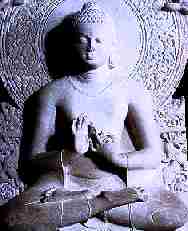 |  |
| <---Back To Sages, Saints and Avatars | Forward---> Sathya Sai Baba |


